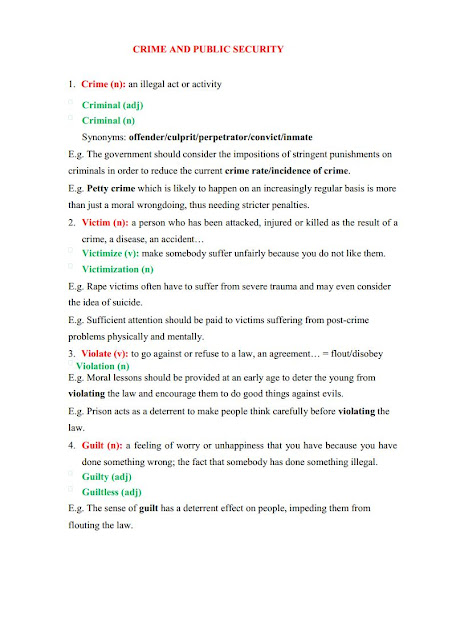Tailieumienphi.top tổng hợp và chia sẻ miễn phí đến thầy cô và các bạn Bộ từ vựng theo chủ đề luyện thi IELTS.
Tài liệu gồm đầy đủ các chủ đề từ vựng luyện thi IELTS, bao gồm 96 trang.
CRIME AND PUBLIC SECURITY 1. Crime (n): an illegal act or activity
Criminal (adj)
Criminal (n)
Synonyms: offender/culprit/perpetrator/convict/inmate E.g. The government should consider the impositions of stringent punishments on criminals in order to reduce the current crime rate/incidence of crime. E.g. Petty crime which is likely to happen on an increasingly regular basis is more than just a moral wrongdoing, thus needing stricter penalties.
2. Victim (n): a person who has been attacked, injured or killed as the result of a crime, a disease, an accident…
Victimize (v): make somebody suffer unfairly because you do not like them.
Victimization (n)
E.g. Rape victims often have to suffer from severe trauma and may even consider the idea of suicide. E.g. Sufficient attention should be paid to victims suffering from post-crime problems physically and mentally.
3. Violate (v): to go against or refuse to a law, an agreement… = flout/disobey
Violation (n)
E.g. Moral lessons should be provided at an early age to deter the young from
violating the law and encourage them to do good things against evils. E.g. Prison acts as a deterrent to make people think carefully before violating the law.
4. Guilt (n): a feeling of worry or unhappiness that you have because you have done something wrong; the fact that somebody has done something illegal.
Guilty (adj)
Guiltless (adj)
E.g. The sense of guilt has a deterrent effect on people, impeding them from flouting the law.
E.g. His guilt was proved beyond all doubt by the prosecution.
5. Innocent (adj): not guilty of a crime
Innocence (n)
E.g. After thorough investigation, he was ultimately declared innocent by the jury. E.g. The accused person should always be presumed innocent until proved guilty by conclusive evidence.
6. Offend (v): to make somebody feel upset because you say or do something that is rude; to commit a crime.
Offender (n)
Offending (adj)
Offense (n)
First-time offender/First offender (n): a person who has been found guilty of a crime for the first time
Hardened/repeat criminal
E.g. His status as a first-time offender may help him to reduce the penalty. E.g. Despite being a first offender, the cold-blooded criminal deserved a death penalty for his appalling murder.
7. Track down/hunt down (v): search for somebody until you find or catch them E.g. The police have tried to track down the notorious gang for a long time but to no avail. E.g. Prompt actions have to be taken so that terrorists will be hunted down, assuring public security.
8. Bring somebody to justice: to arrest somebody for a crime and put them on trial in court E.g. Public outrage has been expressed over the fact that the murderer has yet to be found and brought to justice. E.g. It is the police’s duty to hunt the criminals down and bring them to
justice.
9. Imprison (v): to put somebody in a prison
Imprisonment (n)
E.g. The notorious criminal had ultimately been hunted down and sentenced to life
imprisonment for murder.
E.g. The innocent man had suffered false imprisonment for 10 years before the truth finally came out. 10. Restrict (v): to limit or control something
Restriction (n)
Restrictive (adj)
E.g. The new system of video cameras in public places aims to reduce crime but is believed by some people to restrict individual freedom.
E.g. Parents should allow children only restricted access to the Internet to reduce the negative influence of violent contents online.
11. Rehabilitate (v): to help somebody to have a normal, useful life again after they have been very ill/sick of in prison for a long time.
Rehabilitation (n)
E.g. The new proposals involve rehabilitating even more criminals for life after prison. E.g. The prison service should try to rehabilitate prisoners so that they can lead normal lives when they leave prison.
12. Lenient (adj): not as strict as expected when punishing somebody
Leniency (n)
Leniently (adv)
E.g. A lenient sentence will have little or no effect on the criminals’ incentives to flout the law. E.g. The police and courts may be more lenient with female offenders.
13. Juvenile delinquent (n): a young person (not yet an adult) who is guilty of committing a crime.
Juvenile delinquency (n)
E.g. Juvenile delinquency has been on the increase due to the insufficient care and attention from parents. E.g. It is believed that juvenile delinquency can be put down to peer association with ill-behaved adolescents.
14. Impulsive (adj): acting suddenly without thinking carefully about what might happen because of what you are doing
...

